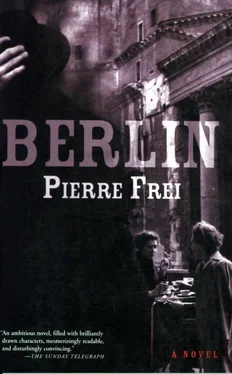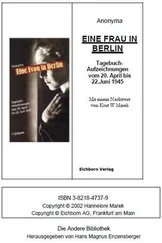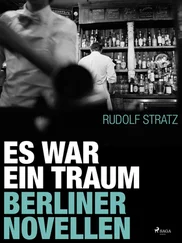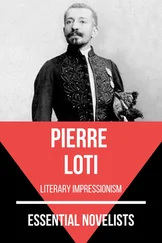Ben pulled their find from the reeds, and carried it from the wobbly island of grass to firm land. The bomb was shaped like a hexagonal stick about six centimetres in diameter and half a metre long. It was made of thermite, as heavy as iron. The upper part had a light aluminium jacket which acted as the control unit. Ben snapped it off. A small, thin lead cross came into view, holding the head of the ignition pin. The cross was supposed to be bent upwards by the force of the impact when the bomb dropped, thus releasing the pin to strike the fuse. It was a simple construction and often failed to work. During the war Ben had quite often let off one of these duds in the sand behind the toboggan run, just to enjoy the firework show.
Before the admiring eyes of both his spectators, he applied the blade of his penknife to the lead cross and bent all four of its shanks up. Then he struck the device on a stone, holding it vertical. There was a plop. Sparks shot out of the holes around the fuse, hissing. Ben held the bomb aloft like a torch. 'Child's play.' He flung it up and away into the air in a high arc. Hajo ran after it. 'Leave it alone,' warned Ben. But the little boy grabbed the end of the thing, which was now burning with a white flame, and held it up with his arm outstretched. 'Like a sparkler,' he shouted enthusiastically.
'Throw it away,' cried Ben.
The detonation came unexpectedly. Hajo's face was suddenly black, and he stared blankly at the place where his hand had just been clutching the burning stick. But there was no stick now, and no hand either. The explosive charge screwed into the improved version of these incendiaries was meant to deter people from throwing them out of the window when they were putting out fires. It had torn the boy's hand off. Hajo collapsed on the ground, his eyes rolling back into his head.
'Oh, shit.' Ben took the belt out of his trousers. 'We must tie it off or he'll bleed to death.' He applied a tourniquet to the unconscious boy's arm with practised expertise; he'd learnt first aid in the Jungvolk.
Franke greeted the inspector excitedly when he returned to the office after his lunch break. 'I knew I'd seen her before. Here, look.' The sergeant opened the movie magazine. Klaus Dietrich saw a picture of a beautiful young blonde standing next to a good-looking man. 'Erik de Winter and Verena van Bergen — the new German movie couple,' announced the caption.
Dietrich was surprised. 'The dead woman from the U-Bahn station.'
She was quite well known.'
'Not to me. I didn't often go to the pictures before the war, and I never got to see the shows in the cinemas at the Front. We were usually fifty kilometres further forward.' Dietrich had served with a Panzer unit.
'First Karin Rembach, now this Helga Lohmann. Both young and pretty,' said Franke, noting the similarities. 'Both blonde with blue eyes. Both killed in the same brutal way…'
'… both employed by the Yanks,' continued Klaus Dietrich, and both murdered after curfew. What does that tell us, Franke?'
'It tells us the murderer is an American, or a German working with the US Army who can be out after curfew. Our witness Kruger suspects a German who drives the Yanks' garbage truck.' Franke told him Gerti's story.
'Try to find out something about this man Ziesel,' Dietrich said. 'Of course it could also be someone out without permission, killing under cover of the general curfew,' he added.
CID Assistant Officer Vollmer put his head round the door. 'Lady called Jutta Weber,' he announced.
The visitor looked pale and exhausted. Klaus Dietrich shook hands with her. 'I'm Inspector Dietrich. You know Herr Franke already. Please sit down, Frau Weber.' He pulled out a chair for his visitor. 'I have a few questions, but it won't take long.'
'Just a moment,' Franke put in. 'First your name, address, date of birth and marital status.' Jutta gave the information he wanted, while the sergeant attacked the antediluvian Erika typewriter, using the one-fingered hunt and peck method. '133 Onkel-Tom-Strasse,' he repeated. 'You live alone there?'
'I share the apartment with a family called Konig and a Herr Brandenburg, who used to be in the Luftwaffe.'
And you found the body last night by the fence of the American enclave at about eleven o'clock, is that right?' Dietrich checked.
'Yes, I was going to see some friends.'
After curfew?' Franke looked up suspiciously.
'I work for the Americans, so I have a pass.'
'Just like the two murdered women,' the sergeant said.
Jutta was horrified. 'Two women?'
'I'm afraid so. You want to be very careful if you're out alone late at night. But don't worry, we'll soon get our man, and you can help us. We've worked out that you must have found the dead woman quite soon after the crime was committed. Did you notice anything? Did you happen to see anyone?'
'No, I mean, well, yes, there was a man riding a motorbike. He emerged out of nowhere and rode past quite close to me.'
'Was he wearing a leather cap and protective goggles?' Klaus Dietrich waited eagerly for the answer.
'I don't know. His headlight dazzled me.'
'Head-light daz-zled me,' Franke hammered out on the typewriter.
'Which way was he going?'
'Towards Onkel Tom. I walked on, and she was just standing there. It was dreadful. Her pale face inside the roll of barbed wire. I didn't recognize her at first. Then I knew who she was.'
The inspector was surprised. 'You knew the dead woman?'
Jutta's eyes filled with tears. 'I used to work in Frau Gerold's bookshop in the shopping street. Helga Lohmann was a customer. She came to our lending library for years with her little boy.' She was weeping quietly.
Klaus Dietrich gave her time. She's as pretty, young, blonde and blueeyed as the two dead women, he thought suddenly. It was an unsettling idea.
She had become a little calmer. 'Goggles with large lenses?'
You just said the headlight of the motorbike dazzled you,' Franke objected crossly. Witnesses could be a real pain.
'No, this was a few days ago when I was going home late from work. A pedestrian. I tried to avoid him and fell off my bicycle. As he bent over me I saw the goggles. Then he disappeared, and next moment I heard a motorbike engine start somewhere quite close.'
'Can you remember when this was?'
'Last Wednesday, around eleven o'clock.'
'Not so fast,' groaned Franke as he struggled with the keys.
'Please would you read and sign your statement,' the inspector asked their witness. 'We have your address in case there are any more questions. Thank you, Frau Weber. Try not to take it too much to heart.' He showed her out.
A serial murderer with a motorbike,' said Franke, narrowing the situation down to a common denominator. 'We Germans had to hand in our cars and motorbikes at the beginning of the war. No one has a motor vehicle today, let alone fuel for it. So the murderer can only be a Yank.'
'Why not one of the French or English occupying forces?' said his boss. 'Or that Dutchman who lives near me? Hendrijk Claasen, big blond fellow. Goes to Nijmegen on his motorbike every two weeks and comes back loaded with black market goods. But he still doesn't have any luck with the women. So my wife says, anyway. Is that suspicious enough for you? On the other hand, how about a Russian coming over to the West on his motorbike by night to commit his crimes here? No, Franke, the murderer isn't necessarily an American. And in any case, who's to say that the murderer and the motor cyclist are one and the same man? What the stationmaster and Frau Weber saw could just as well be a coincidence.'
'Rather too much of a coincidence for me.' muttered the sergeant.
All hell broke loose in the Flora bar in Schoneberg that afternoon. A group of off-duty GIs from the Signal Corps had gone in for a beer and were fooling around with the girls. The Flora was regularly patronized by several GIs from the Transport Division who were also off duty, and claimed prior rights to the Frauleins. Unfortunately the Signal Corps men were white and the truck drivers black.
Читать дальше












